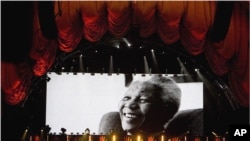South Africa’s government has announced that President Jacob Zuma is scheduled to deliver the state of the nation address to parliament in Cape Town Thursday.
Symbolically, the address coincides with the 20th anniversary of the release of former President Nelson Mandela from prison.
Mandela served 27 years on charges of sabotage, and other crimes allegedly committed while leading the movement against apartheid.
Political analyst, Somadoda Fikeni says the release of Mandela, and his subsequent election as president of the South Africa transformed the country and the world.
“I do think that it is full of symbolism because it is been held on the 20th anniversary of the day Nelson Mandela was freed from prison after 27 and half years….it was an event that was the turning point in our history because it marks the beginning of the end of apartheid era and the beginning of a negotiated settlement that will give democracy. It therefore means it’s a time for reflection on what has been achieved and what has not been achieved in the last 20 years,” he said.
The opposition African Christian Democratic Party (ACDP) has criticized the government’s decision to hold President Zuma's state of the nation address at night.
The government, however, explained that Zuma’s important address will take place in the evening to ensure all South Africans have a chance of listening to his speech.
Fikeni said the government made the right decision to hold the state of the nation address in the evening.
“A decision was taken to allow for the activities during the day to mark the 20th anniversary of Mandela’s release. But also, a decision was taken to make sure that you do have a situation where people at home would be watching this after their work and during the prime time period for the news,” Fikeni said.
According to South Africa media reports, President Zuma is expected to demand greater accountability and more prudent leadership from his cabinet ministers and provincial premiers in his second state of the nation address on Thursday.
Fikeni said the expectations of South Africans are high ahead of the speech.
“They would want him (President Zuma) to assure the world and the country that arrangements for hosting the World Cup will go well and the country is ready…They would like to hear what programs are there to push back the frontiers of poverty and unemployment, which are at a very high level… what programs are there to deal with HIV/AIDS, which is one of the highest in the African continent,” Fikeni said.
Mandela supported reconciliation and negotiation following his release from prison on 11 February 1990, and also helped lead the transition towards multi-racial democracy in South Africa.




